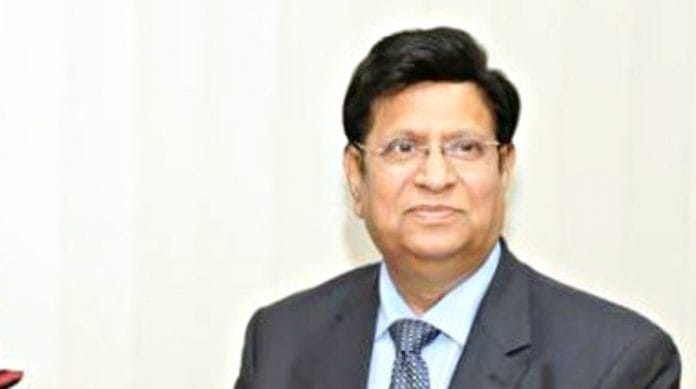New Delhi: Bangladesh Foreign Minister A.K. Abdul Momen Thursday cancelled his India trip, a day after he spoke out against the Citizenship (Amendment) Bill 2019 rolled out by the Narendra Modi government.
Momen was to attend a multilateral event where he was invited as one of the speakers.
Hours later, the Bangladesh Home Minister, Asaduzzaman Khan, also called off a trip to Meghalaya.
Sources told ThePrint that the main reason behind Momen cancelling his trip was because he did not want to discuss the issue of “illegal immigrants from Bangladesh” to India, something that Dhaka has officially denied.
Ministry of External Affairs spokesperson Raveesh Kumar told the media that Momen had to cancel because “the Minister has changed his programme” on account of domestic issues pertaining to the commemoration of the ‘Victory Day’ in Bangladesh on December 16.
Bangladesh High Commission also said that their foreign minister had to cancel the trip “due to some sudden pressing national events at home”.
On Wednesday, Momen had said the citizenship bill weakens India’s secular nature.
“India is historically a tolerant country which believes in secularism (but) their historic position will be weakened if they deviate from that,” Momen told reporters.
The Citizenship (Amendment) Bill, which has been passed by both Lok Sabha and Rajya Sabha, promises citizenship to non-Muslim refugees from India’s Muslim-majority neighbours Pakistan, Afghanistan and Bangladesh.
The cancelled trip comes within days of India detaining 57 Bangladeshi migrant workers from Karnataka, who have been sent to Kolkata to be handed over to Bangladeshi border guards.
The Bangladesh foreign minister was invited to attend the upcoming conference ‘Delhi Dialogue – Advancing Partnership In Indo-Pacific’ organised by the Ministry of External Affairs, ASEAN Secretariat and RIS.
Also read: Bangladeshis would rather swim to Italy than come to India, says outgoing envoy
Minorities in Bangladesh
Momen Wednesday had also denied statements made by Home Minister Amit Shah that Hindus were facing largescale persecution in countries like Pakistan, Afghanistan and Bangladesh.
Official sources, however, said that Shah made it amply clear in both Houses of Parliament that when India talks of persecution of Hindu minorities in Bangladesh, it is not referring to the current Sheikh Hasina’s Awami League government.
On Thursday Kumar said the Bangladesh government is also taking care of religious minorities.
“It is making arrangements also for religious minorities, but there has been a long period in the past in between, during which people came to India on account of religious persecution. This bill is only to give citizenship to those people who came at that time,” he said.
According to another official, although incidents of persecution have come down to a large extent under the Hasina government, about 100-200 Hindus from Bangladesh cross over to India on a daily basis even now.
The official said the incidents of persecution were much higher and more rampant during the rule of the Bangladesh National Party (BNP) and their Islamic fundamentalist allies Jamaat-e-Islami.
“May be not in the urban areas, but in rural Bangladesh, Hindus, especially women are subjected to harassment and been looked down upon. Now they can come to India and start a decent living here,” the official said.
While these migrants can come to India and obtain citizenship under the new law, the question that remains unanswered is if the country has adequate resources to support them.
“Well, the government will give them citizenship. Afterwards they will have to fend for themselves. They will not be given any special privileges,” the official said.
Also read: Bangladesh is pulling ahead, rapidly. Here is why
‘CAB will spell disaster for Neighbourhood First policy’
Experts, though, have a different take on the matter. While some believe the citizenship bill has sent mixed signals to the country’s immediate neighbourhood, especially Bangladesh, some believe it is time to face the challenges and address them.
“The CAB spells disaster for the ‘Neighbourhood First’ policy. This is like creating a Partition-like situation. It is going to give rise to massive chaos. Today, Bangladesh is doing much better than India in terms of human development index and GDP. So, I do not think anybody will leave that country and come to India,” said Deb Mukharji, former High Commissioner of India to Bangladesh.
Mukharji, who was posted as India’s envoy to Dhaka from 1995 to 2000, also said the bill has created a difficult situation for those Hindus who are now citizens of Bangladesh by making them potential “Indian citizens” who will now be subjected to “harassment” and “bullying” by the majority community there.
Veteran diplomat Pinak R. Chakravarty, who was India’s High Commissioner to Dhaka from 2007-09, said it is time New Delhi and Dhaka engage themselves in discussing the issue of illegal immigrants from Bangladesh into India to settle any misunderstanding between the two around CAB.
“This a matter that needs to be discussed. This has certainly come up as a new and emerging challenge in the bilateral ties. However, both governments have to now face the realities,” he added.
Also read: On Citizenship Bill, Modi and Amit Shah don’t really care what Supreme Court will say







A sad development. Ambassador M K Bhadrakumar has written an anguished column in The Citizen. Pointing out how Bangladesh, Afghanistan even more so, have been India’s all weather friends. Assailing their record on treatment of their minorities hurts their self esteem and facts on the ground. Someone has tweeted that the actual number of people who may qualify for grant of Indian citizenship under the amended Citizenship law may be less than 10,000. Others have pointed out that the AIADMK has voted in favour of a Bill that excludes the Tamil minority in Sri Lanka.